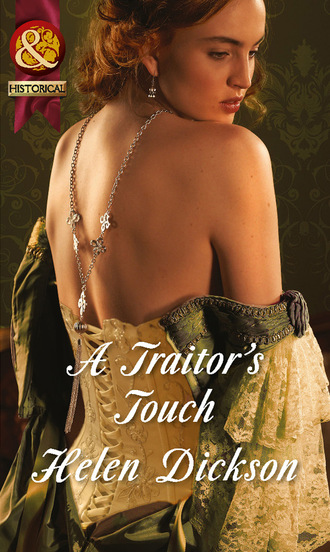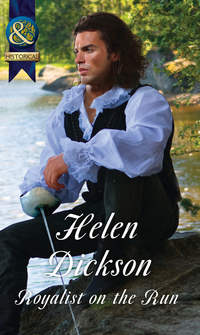
Полная версия
A Traitor's Touch
Jeremy’s eyes flared as her insults hit their mark. His face darkened to a motley red. ‘And you will. I’ll see to that, I promise you,’ he flared, his whole body shaking with rage. ‘Now go to your room and don’t come down again until I give you permission.’
There was a warning in his voice which sent a shiver of fear through Henrietta. She backed away. ‘Most willingly.’
She turned on her heel, leaving the room as two maids came in carrying trays laden with a silver tea service, fine china and a plate of sweet delicacies to tempt the palate.
She was halfway up the stairs when, having second thoughts, she decided to return to try again to inform Jeremy about his uncle’s change of solicitor. The door was ajar and she paused, steeling her nerves for further confrontation, but on hearing Claudia’s shrill voice she remained where she was.
‘I thank the Lord she’s going. She couldn’t continue living here.’
‘Don’t worry, my love,’ Jeremy said, biting into one of cook’s delicious iced cakes, scattering crumbs down his fine silk waistcoat. ‘You won’t have to put up with her for long. Henrietta Brody no longer has any place here and, as soon as the will is read, one way or another she will cease to exist.’
‘It’s a pity we failed to get rid of her along with the old fools. But then we must be thankful that everything went off as we hoped, better even since they had the sense to die and leave you everything.’
‘It had to be done. I couldn’t wait any longer. With creditors baying at the door, it was either that or the debtors’ prison.’ A sudden vision of himself locked in a filthy prison cell at the mercy of other prisoners and the guards flashed into Jeremy’s mind’s eye. It was a vision that had haunted him too much of late for comfort. ‘It’s not too late for Henrietta Brody. I vow I’ll see her hanged before I let her touch an object or a penny of what’s mine.’
Henrietta listened in amazement and shock to this eruption of venom. Horrified, she saw at last the cynical calculation of these two, who had coolly set about playing on her guardians’ goodness and her own innocence. Even more than their revelation was the contemptuous way this creature who was Jeremy’s wife dared to speak of her guardians’ memory that roused her anger.
‘Not only that, the girl’s a papist, isn’t she?’ Claudia added with scorn. ‘They’re likely to stab one in one’s bed with the smallest hint of an uprising. Don’t forget what happened to her father.’
Having heard enough and horrified at what their words implied—that they had been responsible for the death of her guardians and that she would have suffered the same fate had she not pleaded the onset of a cold, which had prevented her attending the theatre that night—Henrietta backed away from the door and, turning quietly, made her way to the baron’s study. The desk where he kept his private papers was locked, the key kept in a drawer in a separate bureau, although the deeds to the house and other important papers he kept with Mr Goodwin.
Opening each drawer in the desk in turn, she sifted through some household accounts until she found what she was looking for. Jeremy was right. There was a copy of the will, but it was the recent will drawn up by Mr Goodwin. Hearing Jeremy leave the morning room and cross the hall to the kitchen where he proceeded to bark orders at the staff, clutching the will in her trembling hand, gingerly she closed the study door. Afraid of making a sound, stealthily she tiptoed across the hall and flitted up the stairs to her room.
With shaking hands she opened the copy of the will and scanned what was written. She read enough to know that if she valued her life she must get away immediately. As Baron Lucas’s sole heir it was natural that Jeremy would expect to inherit his entire estate, but he had excluded Jeremy in favour of her.
Caught in a nightmare, she realised she was completely alone, at the mercy of demons that were intent upon destroying her. Who was to know what Jeremy would be tempted to do if he found out she had knowledge of the terrible crime he’d committed, one he would hang for? And on the morrow when he discovered his uncle had changed his solicitor and made a new will, leaving her everything, the knowledge would elicit terrible repercussions from Jeremy and she was not strong enough to stand against him.
Briefly she considered throwing herself on the mercy of her guardians’ friends, but dismissed this immediately. Jeremy had always been a golden boy and, because of the shocking events in her family’s background, they had quietly resented the position she had acquired in the Lucas household. No one would believe the conversation she had overheard between Jeremy and his wife and that he had murdered his uncle and aunt to get his hands on their money to keep him out of debtors’ prison. It would be her word against his, and were she to seek out Mr Goodwin, he would ensure the inheritance came to her, but he would never believe she was under threat from Jeremy.
So, with no one to whom she could turn to for help and with only herself to rely on, knowing that if she was to save her neck she had to do something, she acted on pure instinct. She would not be beaten. She would not sit and wait for Jeremy to destroy her with the same vicious cunning as he had his aunt and uncle. She had to get away and get away with all speed.
A concerned Rose followed her into her room, where Henrietta lost no time in telling her what had occurred and that she must leave the house with all haste. That Jeremy and his wife had admitted to killing her guardians she kept to herself. The fact that Jeremy could have done something so horrendous was difficult for her to take in, but if he could take the lives of his own flesh and blood without a qualm, he would not turn a hair in getting rid of her.
Sending Rose to find her some clothes suitable for riding a long distance, preferably male attire since she didn’t want to attract attention to herself and her very gender rendered such an undertaking dangerous, she also asked her to instruct Robbie to saddle her horse and bring it into the yard at the back of the house, and not to say a word to anyone. When Rose had disappeared to do her bidding she snatched up some small items she would need—the copy of the will, a purse containing several coins and some of her jewels, so that she could sell them if it became necessary. She also had the presence of mind to arm herself with a small dagger to defend herself from vagabonds and highwaymen. It had belonged to her father and she prayed she would not have occasion to use it. Rose returned with some clothes she’d commandeered from the young groom.
‘Robbie won’t miss these,’ she said, handing her the breeches.
They were ill-fitting and stained with saddle oil and other distasteful substances, but they would serve their purpose. The shirt, which came down to her knees, she tucked into her breeches, and her youthful breasts she bound flat with a snug-fitting chemise. Shoving her arms into the sleeves of one of her old jackets, she thought she was beginning to look the part, but how Lady Lucas would have admonished her ward for riding in such an immodest and unladylike style.
Glancing in the mirror, she considered her features for the hazard they might pose. Was there something that might betray her: the pert nose, the large green eyes that slanted upwards, her long silky black lashes and the soft, too-pink and delicate mouth? Small and slender, she would have no trouble passing herself off as a youth—not even Jeremy would recognise her dressed like this, but she would have to do something about her hair. The long, soft, curling tresses would become a liability she could ill afford.
‘I hope you know what you’re doing,’ Rose said, deeply concerned for her safety.
‘I don’t, Rose,’ Henrietta said, handing her the scissors. ‘All I know is that I cannot stay here with Jeremy. What I heard tonight gives me reason to fear for my life. I have to get away and it’s imperative that I look the part, which is why I want you to cut my hair.’
Rose was appalled at what she was being asked to do. ‘But—your lovely hair? I can’t do that.’
‘Yes, you can. It’s necessary. This is a time for survival, Rose, not girlish longings. It will soon grow again. Now hurry. I have to leave before Jeremy comes looking for me.’
* * *
When Rose had completed her task and disposed of the shorn hair, Henrietta heard Jeremy down below, his voice raised in anger. Hearing the noise of the study door banging shut, the noise reverberating through the house, she trembled with fear.
‘Where is she, damn you?’ he shouted to a terrified servant, having decided to take a look at his uncle’s documents and being unable to find the key to his desk. ‘In her room, is she? Get her. She will not hide from me.’
Suddenly Henrietta felt Rose’s arms around her. A sudden tug of emotion made her hug Rose in return. Before the feeling could turn to tears, she pulled away and stood upright like a soldier.
‘This is just terrible,’ a tearful Rose said, wiping her wet cheeks. ‘That you are being forced to leave your own home without a place to go. Where will you go?’
In her present terrible plight, there was only one place Henrietta could go, only one person who could help and advise her—her uncle—and he was hundreds of miles away in the wilds of Scotland. She was in no doubt that it would be a monumental undertaking for her to get there safely. Fearing that Jeremy would interrogate Rose and demand to know her whereabouts, Henrietta considered she was better off not knowing. ‘I can’t tell you that, Rose, but I mean to leave London. I’ll write to you when I reach my destination. I promise. Wish me luck, Rose.’
‘I always do, miss. God keep you safe,’ Rose whispered. ‘I will be praying for you.’
Shrouded in a black woollen cloak, her cropped red-gold hair dulled with a smidgen of soot and hidden beneath a wide-brimmed hat, hearing Jeremy’s loud, harsh tones, with hate beating a bitter note in her breast, Henrietta hurried out of a back door to her waiting horse. She shivered as the reality of what she was planning to undertake hit her. It would be wiser to wait until morning, to set out on her journey in the light rather than in the dark, but she could not wait. Without a backward glance, like a shadow she slipped away on to Hampstead Heath without encountering a living soul.
* * *
As she rode on to the heath, Henrietta looked around with renewed spirit and saw that no black clouds hung in the sky to mar her plans. There was no hampering wind, either, and, since it was late August, the air was warm. Fortunately for her, she knew the heath well and there was no lane or byway with which she was not familiar. It was a rambling, hilly place embracing ponds and ancient woodlands. Unfortunately Hampstead Heath had a sinister reputation for criminals. There was no doubt that there were major hazards to crossing it at night and that ordinary dangers were compounded by those threatened by highwaymen.
Driven by some compelling need to put as much distance as she could between her and the threat Jeremy Lucas posed, digging in her heels she rode off at a gallop, the horse’s hooves thudding over the turf. Approaching woodland, fearing she might be knocked from her horse by low branches, she slowed her horse to a walk and entered the interior. Every now and then she paused to listen, straining her ears for every sound. All was silent in the darkness. The moon and stars were hidden behind thick cloud.
She picked her way through the undergrowth and stopped when she came to a clearing, staring at the dark silhouette which was the tumbled ruin of a cottage. There were no lights showing. Intending to ride on by, she looked ahead. As she did so, something flashed in the corner of her eye. She swung about—a lantern had been put out and she realised there was someone outside the building. Afraid that if she rode on whoever it was that lurked there would come after her, dismounting, she tethered her horse to a branch. With her heart thudding in her chest, she crept forward and ran the last few paces, crouching against a side wall and creeping towards the corner of the building. Pressing herself against the wall, she realised only then that her legs were shaking beneath her. For a panic-filled moment, the mere awareness of her fear threatened to collapse her self-control, but she pressed trembling fingers to her lips, resolving to overcome her trepidations by her own will and fortitude. Though the full moon gleamed brightly overhead and cast a strip of moonlight over the ruin, deep in the shadows along the walls the blackness was almost palpable.
Holding her breath, she peered around the corner, seeing that she was several feet from what had once been the door. A man was skulking in the gloom, long and dark like the shadows. She waited until her heart had slowed and her breathing had steadied. Somewhere on the heath she heard an owl calling, the haunting sound echoing in the silence. Hardly breathing, soundlessly she pressed herself against the wall and waited.
Suddenly she heard the sound of horses, the thump of their hooves on the ground and the clink of their harnesses. Retreating along the wall, she stood in the shadows. Three men rode up and halted in front of the building. They slid to the ground and the man in the shadows stepped forward to greet them.
Her curiosity getting the better of her, Henrietta crept forward once more to observe them more closely, straining her eyes in the darkness as she wondered at the reason for them meeting so furtively. She could see the outline of the horses and the shape of the men. They stood close together, murmuring in consultation. Two of them broke away and walked in her direction, pausing to converse. Straining her ears, she was just able to hear what they said.
‘Good to see you, Jack,’ the man who had been waiting said.
‘Have you been waiting long, Simon?’ asked Jack.
‘About half an hour,’ Simon replied in low tones.
‘You have come from Dover?’
‘I met with the agent. He’s a reliable source—a Frenchman and a friend. He deals in commodities and is of great use to us.’
‘Just one of our brave liaisons. You’ve a long ride ahead of you before you reach Edinburgh.’
‘Aye, but a necessary one. I mean to stop at my home over the border. I have arrangements to make should things not turn out as we hope. I’ve one or two loose ends to tie up here in London, but I hope to be heading north long before dawn. It appears Prince Charles has arrived in Scotland with only a handful of men. It will be common knowledge soon. Convinced the English Jacobites will stage an uprising, he is already planning to invade England. I mean to ride north to assess the situation.’
‘I’m loyal to the cause, but planning a rising to put his father on the throne is foolish in my opinion.’
‘I couldn’t agree more,’ Simon said, ‘but he had his head set on it. The proclamation states that by the ordination of Almighty God, King James, VIII of Scotland and III of England and Ireland, asserts his just rights to claim the throne of three kingdoms, and to acknowledge the support of these divine rights by the chieftains of the Highland clans and Jacobite lords—and various other such loyal subjects of His Majesty King James. We need soldiers, weapons and money, which we don’t have.’
‘Then he will fail. We need the French to succeed.’
‘If we wait for the French to help us, we’ll be waiting a long time. But then again, with the British at war with France and all the armies fighting in Europe, perhaps now is the time to act.’
Simon shook his head. ‘I have my doubts. I fear support in Scotland may be lacking. Some clan chieftains will rally to the call. Others who are loyal to the British government will not. There are many who consider it a better place since the Stuarts left. It has become a proud nation—united with England. The people have grown richer, more powerful and more respected throughout the world. They fear the return of the Stuarts will bring fresh misery and have no stomach for war. What of you, Jack? Are you afraid to continue? Does he have your support?’
‘Certainly. We’ve come too far to retreat. I will inform our men here in London of events. To bring about the change there is nothing that I would not do on behalf of Charles Stuart. If he succeeds, I will know I played my part. Few men will be able to claim as much. What do you think, Simon?’
‘I agree, but it would be better if King George could be removed by diplomatic coercion.’
‘That won’t happen. The part you play in this drama is great and heroic. You are to be just one of our liaisons in the north. We could not have chosen a man who knows that part of the world better.’
‘True, I know it well enough. But if the rebellion is to succeed, there are grave times ahead. Those who support Prince Charles will be branded as rebels and as traitors to the English Crown.’
‘It will be nothing to what our fellow Catholics have already endured. If they have been safe for a time, it is only because they—we—have learned to be silent. You, Simon, rebel in the name of the Stuarts, I in the name of the Catholic martyrs. We have suffered for over two hundred years. This will be just one more test of our resolve—I pray it will be the last.’
‘I agree, but I cannot imagine that Prince Charles’s arrival after so many years of darkness and despair for the Jacobites is about to allow the sun to break through the clouds.’
Realising her curiosity had unwittingly placed her in danger, Henrietta followed this exchange with amazed disbelief. Beyond a doubt, everything that had happened to her in the past few hours had the incoherence of a bad dream. She was shaken, for in this day of Jacobites, of plots and counterplots, imprisonment and treason, it would seem she had stumbled across a nest of Jacobite conspirators. Somewhere in the dark chambers of her mind a memory stirred—not a pleasant memory—and her father’s tortured face flickered for a moment in her mind’s eye, which she quickly shoved away. A cold shiver travelled down her spine.
As a Catholic, she had followed the Jacobite cause with reluctant interest. James Stuart’s court, the exiled king of Scotland—or the Pretender to the throne, depending on one’s loyalties—was in Rome. He had mounted an abortive attempt to regain his throne in 1715 and had failed through lack of support. Since then he had worked ceaselessly at trying to gain support from fellow monarchs, reiterating his son Charles’s legitimacy to the throne of Scotland and England.
What she had just overheard suggested that Charles Edward Stuart had come to claim his father’s throne, prepared to resort to armed rebellion to restore the Stuart monarchy. As she adjusted her position her cloak brushed against the wall, dislodging a loose stone, which fell at her feet with a soft thud. It alerted the men and they fell silent. She stood stock-still, her heart drumming in her chest, and cold sweat trickled along the side of her face and down her spine. She knew that her breathing must be deafening—she was certain that she could be seen and heard in spite of the darkness.
A long moment passed. Hearing the men exhaling ragged oaths, she also heard footsteps coming closer. She shuddered and swayed slightly to keep her balance. She was sure that they would find her. She had to get away. Cautiously she began to retreat backwards. A man stepped round the corner of the building—a formidable silhouette bent on bloody murder. He stood motionless, staring at her. The moon chose that moment to slip from behind a cloud, haloing his tall, powerfully muscled form with its brilliance. His hat was slung low over his face, shadowing his features, but she thought she saw his eyes, and ironic ones they were. His gauntlets were made of fine leather, with gold thread trimming the edges. While she wore one of her old cloaks, this man wore a cloak of fine black cloth interfaced in gold. He said not a word as their eyes clashed across the distance.
Like the prey entranced by the predator, Henrietta was momentarily transfixed. She remembered then of the harm he might do to her. He did not speak, but the second he moved towards her, she whirled around and fled in the direction of her horse. She raced with all the stealth at her command, but when her foot caught in a hole she nearly tumbled headlong. Recovering her balance, she rushed on. She could sense the man coming after her, feel him gaining on her, and then he reached for her, but in the blink of an eye, she ducked under his arm and fled.
‘Oh, no, you don’t,’ he growled. Pivoting round, he reached out and grabbed her, wrenching her arm up her back. ‘I wouldn’t struggle, if I were you, boy. Stay put,’ he coolly ordered.
Letting out a cry Henrietta struggled to free herself, but she was no match for his strength. With one hand he grasped her arm, and with the other resting on the hilt of his sword he hauled her back to the others.
‘Keep still, you little savage. It will do you no good. Lower your weapons,’ he said to his comrades. ‘’Tis naught but a youth.’
The sound of his voice sent a thrill down Henrietta’s spine, and she trembled for some unknown reason. Glancing at the men, the one called Jack brandishing a dagger, told Henrietta that they wanted blood. Suffering the painful grip, she began to fear for her life. When she had come to live on the edge of the heath, one of the old grooms, who loved to tell stories, had told her a host of gruesome tales about the fearsome things that had happened to people who had been on the heath after dark. She would never have believed that such things could happen to her. But one cannot be confronted by four dangerous men and not fear for one’s life.
Little by little, she was learning the hard way that most cruel of all lessons—that if she were to survive, she would have to use all her wits to do so. But she guessed she was not going to be good at deception. It did not come naturally to her. She had no experience of it and had never had reason to resort to dishonesty.
Though she held her chin high and glared in a show of grand defiance, she knew she was defenceless. But when she glanced at her captor, big, black and fierce and for all the world like some fearsome being from Hades itself, a strange, murderously tranquil smile on his face, she blanched and, when he released his hold on her arm, she spun around, seeking any escape route. Unable to see a way past the men who had formed a ring around her, there was nowhere to flee. Her heart pounded. The man called Jack reached out to try to grab her, and Henrietta reacted in self-defence, reaching for the knife in her belt, the blade flashing wickedly in the moonlight. Jack fell back with a garbled curse.
‘Why, you young pup, I’ll gut you for that.’
‘Try it if you want my blade in your own,’ she replied with admirable self-possession, pitching her voice low, while inside she was trembling with terror, knowing she would never have the courage to use the weapon.
Simon looked her over. It was clear the lad could take care of himself, but he was insane if he thought he could take on the lot of them. He held out his hand. ‘That’s a nasty blade you have there, lad. Hand it over.’
Henrietta’s eyes were wide, filled with fright. She swept the surrounding men with a nervous glance. ‘And get myself killed?’
‘You’re already in trouble and you can see you can’t escape. Don’t make this any worse for yourself than it already is.’
She wetted her lips with a nervous flick of her tongue and again eyed the men. ‘But they—’
‘I’m the one you’d better worry about,’ he warned in a low voice. ‘Give me the knife,’ he coolly ordered. ‘And do that very slowly, for I am not at all amused.’
Henrietta grimaced at the man’s unintentional pun, but she did not relinquish her weapon.
He waited immovably, the men looking on in palpable tension as the fierce youth dared refuse Simon’s order.
Simon flicked his fingers impatiently, beckoning her to hand the knife over—he stretched out his waiting palm, watching her intently. ‘Hand it over,’ he said in a hard tone. ‘You’ve got no choice.’
Henrietta agonised over the decision, the war of emotions transparent on her face, but after a long moment, she slowly yielded, handing it over.








